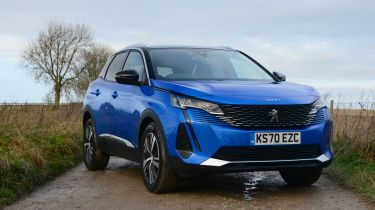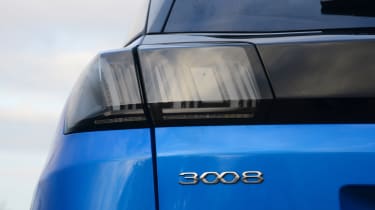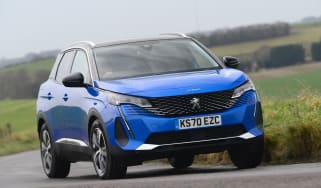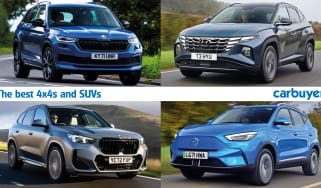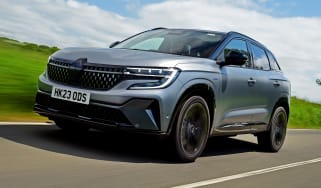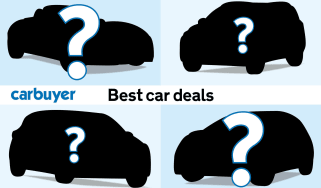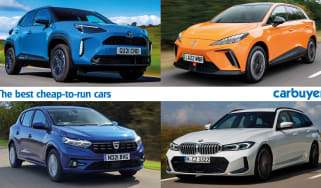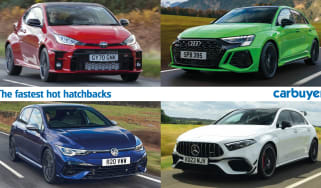Peugeot 3008 review - MPG, running costs & CO2 (2017-2024)
Like many modern SUVs, the Peugeot 3008 is almost as cheap to run as a family hatchback
The Peugeot 3008 takes full advantage of the latest manufacturing techniques, using strong-yet-light steel, aluminium and plastics. This means it can be fitted with relatively small engines that offer excellent running costs, catering to the thousands of buyers who covet an SUV but don’t want big bills. An electrified version of the 1.2-litre petrol engine also arrived in mid-2023 to plug the gap between the petrol and diesel 3008 and the pricey plug-in hybrid.
On a PCP or leasing deal, you should pay less for the 3008 than for an equivalent Volkswagen Tiguan. Top-spec hybrid cars will cost considerably more than an entry-level petrol version, though.
Peugeot 3008 MPG & CO2
The 128bhp 1.5-litre diesel officially returns up to 54.1mpg and emits 137-163g/km of CO2 with the now-standard eight-speed automatic gearbox. You could previously buy a 2.0-litre diesel, but the 175bhp engine wasn’t particularly efficient, officially returning up to 47.3mpg and 162-178g/km of CO2.
The 1.2-litre petrol engine is a good budget choice for buyers likely to do a mix of shorter trips around town and a little motorway driving. It can return up to 46.4mpg and emits 138-167g/km of CO2. There’s now a mild-hybrid assisted version, which takes some strain off the 1.2-litre engine, allowing for up to 53.3mpg and lower CO2 emissions of 120g/km, making it the sweet spot in the range for many buyers.
The biggest difference in urban driving is how much of the time you’ll see the dashboard font turning blue, indicating that the petrol engine is off and just the electric motor is powering the car. During our test in city and motorway driving, we managed an average of 45mpg and would expect this to be easy to beat in mostly urban and suburban driving.
More reviews
Officially, the most economical model is the range-topping Peugeot 3008 Hybrid 225, which is a direct rival to the Ford Kuga plug-in hybrid, and is said to return up to 250mpg. It’s worth pointing out that you’ll struggle to achieve close to this figure unless you religiously charge up the battery and only use the car for short, urban trips. CO2 emissions are remarkably low at 26-36g/km, which will please company-car drivers. The less powerful front-wheel-drive hybrid model is capable of up to 221mpg with official emissions from 29 to 41g/km.
The Hybrid 180 model can cover up to 39 miles when its 12.4kWh battery is fully charged, while the Hybrid 225’s larger 14.2kWh battery means it can cover up to 43 miles. If you don’t charge the electric motor and run the car on petrol power alone, you’ll find fuel economy will suffer significantly, because the heavy battery becomes a burden instead of giving the car an advantage.
If you have access to a 7kW home charger and add the Peugeot 3008’s optional 7.4kW onboard charger, you can fully replenish the battery in around one hour 45 minutes – it’s a shame this isn’t included on all models, though, as the standard 3.5kW charger takes around twice as long. You’ll need to wait eight hours for the battery to get to full charge if you’re using a standard three-pin socket. A dedicated smartphone app lets you choose when to charge the car (so you can charge overnight on a cheaper tariff, for example) and set the air-conditioning before you get in.
Company car drivers should find the Benefit-In-Kind (BiK) tax rates attractive, especially for the hybrid models. VED (road tax) for private buyers is charged at the standard rate for all petrol and diesel models with the hybrids liable for the discounted rate. Flagship models can cost over £40,000, and these will be subject to a surcharge until the car is six years old.
Insurance groups
 Best used cars with cheap road tax and insurance
Best used cars with cheap road tax and insurance
The Peugeot 3008 sits in groups 22-38 for insurance. The conventional petrol and diesel models are all rated in group 22, with only the more powerful petrol and Hybrids punching above the group 22 mark.
Warranty
Peugeot’s three-year/60,000-mile warranty used to be about average for the industry, but with Hyundai, Toyota, Kia, Mercedes and BMW also offering better protection, we’d argue it’s time for Peugeot to up its game here.
Servicing
Peugeot’s fixed-price servicing packages make budgeting for maintenance easy, and policies start from around £20 each month if you take out a three-year deal.
Which Is Best?
Cheapest
- Name1.2 Hybrid 136 Allure 5dr e-DSC6
- Gearbox typeSemi-auto
- RRP£35,660
Most Economical
- Name1.6 Plug-in Hybrid 195 Allure 5dr Auto
- Gearbox typeSemi-auto
- RRP£40,750
Fastest
- Name1.6 Plug-in Hybrid 195 Allure 5dr Auto
- Gearbox typeSemi-auto
- RRP£40,750
